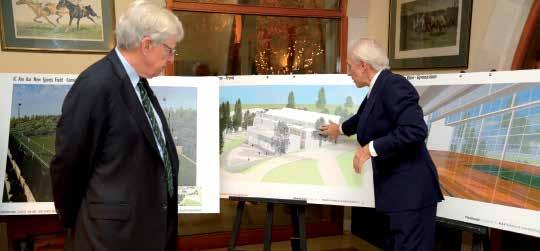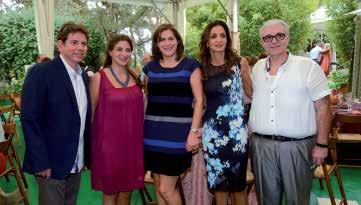
5 minute read
Dr. Fadlo Khuri
The 16th President of AUB:
Dr. FaDlo Khuri ‘81
Dr. Fadlo R. Khuri ’81 never thought that he would one day be a leading figure in cancer research. Neither did it occur to him that he would be the recipient of so many awards in the field.
And he certainly never imagined that he would be where he is today: The 16th President of the American University of Beirut.
It all happened because of a stranger.
As a young medical student, Khuri had planned on becoming a psychiatrist. But then he met this stranger with cancer on the first day of his 3rd year of medical school. The stranger, an affable older man, died within four weeks. Having seen firsthand the devastation of the disease, the transformed and energized young Khuri became determined to dedicate his life to improving the lives of patients.
He received his Bachelor’s degree from Yale University (he attended AUB for one year from 1981-1982) and his M.D. from Columbia University.
In 1995, he became a faculty member at the University of Texas M.D. Anderson Cancer Center. In 2002, he joined the Winship Cancer Institute and later received the Roberto C. Goizueta Distinguished Chair for Cancer Research.
Until recently, he was the Deputy Director of the Winship Cancer Center, the Chairman of the Department of Hematology and Medical Oncology and the Executive Associate Dean for Research at the Emory University School of Medicine in Atlanta, GA.
His clinical expertise and research has focused on the development of novel molecular, prognostic, therapeutic, and
chemo preventive approaches to improve the standard of care for patients with lung and aerodigestive cancers.
He has led the recruitment of over 90 faculty including 60 clinical investigators to Emory University, and co-founded Winship’s Cancer Drug Discovery, Development and Delivery Program. He has so far treated over 10,000 cancer patients. His published work has been cited over 15,000 times internationally.
And now the big question: what brought this doctor, who sought to find a possible cure for the devastating diseases that are lung and neck cancer, back to Beirut?
The amiable Khuri responds simply. “It’s not about me at all. It is all about the patients. We built a superb team at Emory, and they are continuing with the research. If you do good things, others will carry the work forward.”
Despite his heavy schedule, Khuri did manage to meet and marry Lebaneseborn Lamya Tannous, PhD. The couple have three children: Layla (Yale College, Class of 2016), Raja (Emory College, Class of 2018), and Rayya (now an 11th grader at ACS), all of whom were at the Atlanta International IB school.
Khuri had just turned down a job offer of being the Cancer Center Director and Associate Dean of the Medical School at the University of Michigan when he heard about AUB’s job opening. Former AUB President Dr. Peter Dorman had announced his intention to resign in June of last year, spurring an international search for a highly qualified potential president.
Khuri couldn’t help but be intrigued. He had always regarded AUB not just as an institution of higher learning but one whose influence has been unparalleled in the entire region.
“But after the war, it became the AUB in Beirut rather than AUB of Beirut and for the world,” he said. “I didn’t feel satisfied with this repositioning of the university. I felt it needed to be more impactful and influential than it had become.”
The job appealed to him. “I would like to re-expand the role of AUB and its influence and excellence in the region,” he said. “We used to have a transformative impact in the region and we need to have that impact again. So, like lung cancer and like the areas of research that I had gone into and like my move from MD Anderson to Emory, I know that I can make this significant and positive impact at AUB.”
It was a big family decision. They were in their “comfort zone”. Nice house, great school, good income, successful careers, excellent reputation, moderate traffic (most of the time!), and, well, no garbage crisis. Still, it was a chance to make a difference in their home country. (Fortunately, he has no interest in Lebanese politics). “I’ve always been about pushing past my comfort zone,” he said. “I want to make a meaningful difference. But you can rarely make a difference when you are willing to be comfortable.”
Moreover, Khuri had many fond memories of IC and thus, Ras Beirut. He comes from a long line of IC alumni and never forgot his teachers - many of whom have left a major impact on his life. “What I most liked about IC was that it immediately took away any apprehension someone might have about diversity. It gave me an absence of prejudice,” he recalled. He made many lifelong friends at IC, many of whom have since returned to Beirut. He especially cited the influence of his teachers William Smathers, who encouraged him to be a more expressive writer, and Nadi Nader, who built his confidence in and his comprehension of mathematics.
Decision made, Khuri and his wife packed and up and moved with their youngest daughter to the Marquand House - the same place which has housed AUB Presidents since 1879.
Thanks to his medical background, he promises to bring new dimensions to the university.
“It’s not just about ‘take our courses, get the grades and go out to become good ambassadors’,” he said. “I would like to see a more holistic approach to learning. One which looks at the emotional, psychological, maturation and stress issues our kids feel.”
In the future pipeline are world class online learning, an expanded university for seniors program and a large recruitment of international faculty and students.
“In five years, we should be the top choice of where to send your child, whether you live in Beirut or Bangladesh,” he said. “You would know that when your kids leave AUB, they will leave here as positive change agents.”
The best news is yet to come: Khuri has recently been given permission to practice medicine at AUH - allowing him to apply his internationally acclaimed skills on Lebanon’s cancer patients.

Standing row: R to L : Karim and Hussein Ibish (both ACS), Nadim Farajalla ’81. Seated: L to R: Fadlo Khuri (with glasses and blue sweater), Sari Acra ’81










